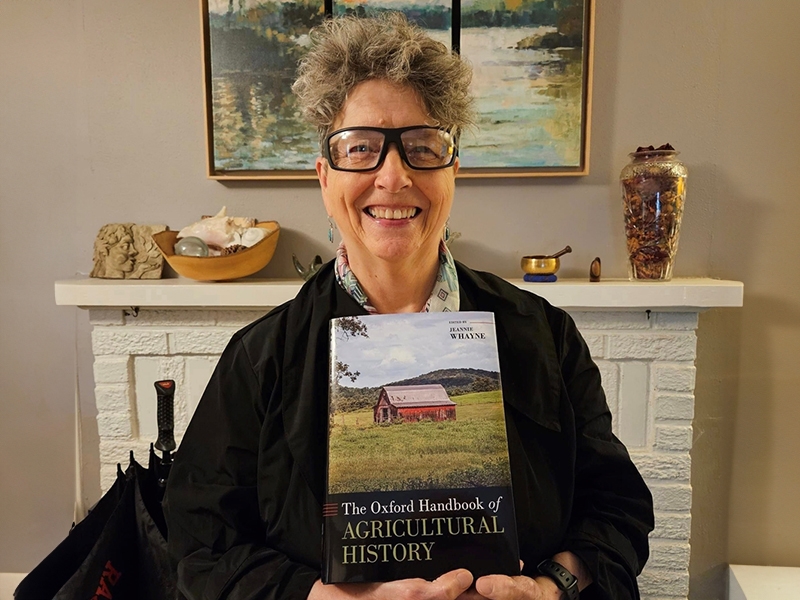'Oxford Handbook of Agricultural History' Published by U of A Historian
The Oxford Handbook of Agricultural History, edited by Jeannie Whayne of the U of A Department of History, was recently published. Whayne says that agricultural history has enjoyed a rebirth in recent years, in part because of the way the agricultural enterprise promotes economic and cultural connections in an era that has become ever more globally focused.
However, there was little in the way of an over-arching historiography of world agriculture, but many historiographical traditions within geographic regions across the world that intersected either directly in the historiography or indirectly in subject matter. Whayne, who has written books and articles on the Southern plantations system since the Civil War, reports that she became acutely aware of the global interconnections through presenting papers at conferences of the European Rural History Organization and the Global Congress of Environmental History.
She presented papers on Southern plantation history, race relations and women in agriculture at these meetings and attended sessions on European-focused rural and agricultural history. She observed that their findings were often similar to her own but in a very different context. It transformed her thinking about how to understand the Southern plantation system.
The volume is designed to promote a broader perspective on subjects typically discussed in geographic isolation. Authors eschew the restriction of local or national boundaries and write within a comparative framework. In that sense, the volume promotes the development of a global agricultural historiography. The volume also showcases the historiographical trends on topics already written in a global framework, exposing a new generation of scholars to those debates.
The chapters are divided into four sections. Part I, Timeless Essentials, introduces the crucial elements of agricultural production as they changed over time. It begins with the basic material ingredients necessary for agriculture to exist: soil fertility and seeds. It proceeds from there to include another basic staple, livestock, and the challenges that have plagued farmers from agriculture's earliest appearance: pests, epidemics and other biological contestations. From there the volume moves to the human component: labor, the peasantry and the role of women in agriculture.
Part II, Modern Essentials, captures the fundamental difference of modern production methods. This section includes chapters on machines, scientific agriculture, corporate farming and expert networks, among others. Part III, Exemplary Commodities, speaks to how issues raised in Parts I and II work in concert. This section consists of 10 chapters on various commodities from food products like wheat, corn and rice to non-food items like cotton, tobacco and sericulture.
Part IV, Key Transitions, probes watershed moments that gave birth to so-called "killer applications." It includes chapters covering the current debate over the Neolithic Revolution and its contestations, the Atlantic Plantation and the Arab and British agricultural revolutions.
The 634-page volume consists of 35 chapters written by scholars of Africa, Asia, Australia, Europe and the Americas. Whayne's own essay, "Agriculture, the Atlantic Plantation, and the Environment in the U.S. South," appears in Part IV and explores the long-term connection between Southern agricultural producers and the United Kingdom in the context of the development and maturation of the Atlantic plantation. It also probes the detrimental effects agricultural methods of commodity production, particularly those of tobacco and cotton planters, on Southern soils. She considers the role of African American enslaved people and the ways they used the landscape on the periphery of plantations to lightly carve out space for a modicum of independence and stealth resistance.
Whayne is University Professor in the Department of History and an award-winning scholar, teacher and mentor. Over her 34 years at the university, she has authored, co-authored or edited 12 books and published dozens of single-author essays in scholarly journals and books.
She twice won the Arkansas Historical Association's book award and is a recipient of that organization's Lifetime Achievement Award. She is past president of the Agricultural History Society, which awarded her the Gladys Baker Award for Lifetime Achievement in the field of agricultural history. She is a distinguished lecturer with the Organization of American Historians. She has won many teaching and mentoring awards at the U of A and is past president of the Teaching Academy and former co-director of the Teaching & Faculty Support Center. She is also a recipient of Fulbright College's John King Award for Service and the U of A's Distinguished Service Award. She spent many years on the Faculty Senate and served as chair of Campus Faculty and of Faculty Senate.
Oxford University's Handbook Series is well known across a number of disciplines and is available to the campus community in its online version through the University of Arkansas Libraries.
Topics
Contacts
Melinda Adams, administrative specialist III
Department of History
479-575-2096,
mmadams@uark.edu
Headlines
PetSmart CEO J.K. Symancyk to Speak at Walton College Commencement
J.K. Symancyk is an alumnus of the Sam M. Walton College of Business and serves on the Dean’s Executive Advisory Board.
Faulkner Center, Arkansas PBS Partner to Screen Documentary 'Gospel'
The Faulkner Performing Arts Center will host a screening of Gospel, a documentary exploring the origin of Black spirituality through sermon and song, in partnership with Arkansas PBS at 7:30 p.m. Thursday, May 2.
UAPD Officers Mills and Edwards Honored With New Roles
Veterans of the U of A Police Department, Matt Mills has been promoted to assistant chief, and Crandall Edwards has been promoted to administrative captain.
Community Design Center's Greenway Urbanism Project Wins LIV Hospitality Design Award
"Greenway Urbanism" is one of six urban strategies proposed under the Framework Plan for Cherokee Village, a project that received funding through an Our Town grant from the National Endowment for the Arts.
Spring Bike Drive Refurbishes Old Bikes for New Students
All donated bikes will be given to Pedal It Forward, a local nonprofit that will refurbish your bike and return it to the U of A campus to be gifted to a student in need. Hundreds of students have already benefited.





